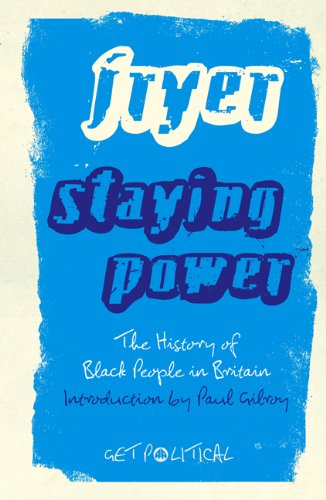‘Peter Fryer, Staying Power’, Review, Black and Asian Studies Association Newsletter, 59 (March 2011), pp. 36-7.

Fryer’s masterly synthesis is still an impressive read 26 years after it was originally published. It has become a classic, a standard reference text. Although much research has been made recently into the areas he covers, no one has as yet made the labour of love necessary to bring it all together again in one narrative sweep. Fryer takes us through the history of the black presence in Britain from the Romans to the Brixton riots. His journalistic background shines through in his easy narrative style, and masterful handling of a myriad of facts. However, the narrative imperative does obscure much analysis, or argument more complicated that ‘we woz ‘ere’. That said, some facts speak for themselves, such as the account of the colonial planter who muzzled his cook to prevent her from eating his food as she prepared it or Learie Constantine, the famous Trinidadian cricketer being barred from a London hotel in 1943. There is an overly broad definition of the term ‘black’. Fryer unquestioningly takes on the perspective of the racialists- that all non-whites are ‘black’, and so tries to bring together the very different stories of Asian and African immigration, whilst devoting far more space to the African.
It was in fact his role as a journalist that first piqued his interest in the subject, when he was sent to cover the arrival of the Empire Windrush in 1948. His book ably demonstrates the ignorance of those who believed this was the first arrival of blacks in Britain, and who called for them to go back to where they came from. In fact he shows that there were black people in Britain before the Anglo-Saxons arrived! The book also reveals the casual racism of some of Britain’s most fêted historical figures. Both Winston Churchill and Florence Nightingale are shown to have said and done things that are abominable by modern standards.
Ultimately, this is an excellent book that has not been surpassed in breadth or detail since it’s first publication in 1984. It is only sad that Fryer is no longer here to bring out an updated edition, and perhaps to question the publisher’s choice of cover design!
It was in fact his role as a journalist that first piqued his interest in the subject, when he was sent to cover the arrival of the Empire Windrush in 1948. His book ably demonstrates the ignorance of those who believed this was the first arrival of blacks in Britain, and who called for them to go back to where they came from. In fact he shows that there were black people in Britain before the Anglo-Saxons arrived! The book also reveals the casual racism of some of Britain’s most fêted historical figures. Both Winston Churchill and Florence Nightingale are shown to have said and done things that are abominable by modern standards.
Ultimately, this is an excellent book that has not been surpassed in breadth or detail since it’s first publication in 1984. It is only sad that Fryer is no longer here to bring out an updated edition, and perhaps to question the publisher’s choice of cover design!
